ROKIA TRAORÉ / “The Man I Love”
I thought Rokia Traoré’s third album, Bowmboï, was exquisite but Tachmantché surpasses that high mark. Rokia was already working with a small palette of instruments and approaches. Using traditional instruments of Mali albeit in unusual combinations, Traoré was simultaneously a keeper of the traditional flame and an iconoclast lighting the way ahead.

Rokia’s music radiates a calm, soothing vibration even at dance tempos. The music practically invites you to snuggle up to it, as the vibes caress your skin and kiss your ears.
I had hoped that she would produce more in the line of Bowmboï but I had also feared that it would be difficult, if not impossible, to follow up without sounding like she was just repeating a successful formula.
Oh, me of little faith.
Rokia Traoré is a miracle worker.
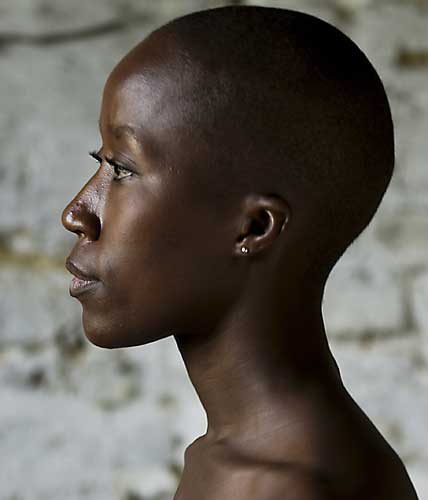
Over the past few years I've been inundated with invitations to work on very different projects. And I've always made it clear that I wanted to break away from the musical style I'd evolved with. Personally, I think it's a shame to get stuck playing in one particular style and never change. Having said that, though, you can't really take the liberty of throwing everything up in the air no matter when. It was after releasing Bowmboi, in 2003, that I felt I'd come to the end of a certain approach. I knew one thing for sure and that was that I didn't want to go on working with the same style of orchestration. Up until then the balafon had always been the major base of my sound. But then I found I'd reached a point where I'd done all I could with it. And I thought, "Well, if I'm going to make a change, it might as well be a radical one!"
—Rokia Traore
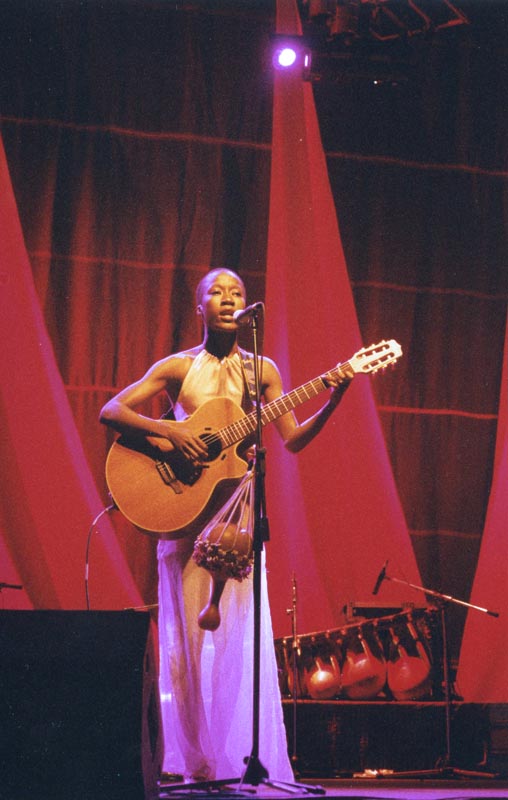
Rokia is a slender woman. Big eyes, hears everything, speaks about eleven dozen languages, is comfortable in the world, the whole world. Truly sophisticated and simultaneously, deeply grounded in a specific and ancient culture. She is an earthly and earthy goddess. Beauty in body and soul.
She could have stayed on what worked for at least two more albums, maybe doing a live album and following up with a handful of new songs written in the same vein.
No. What we have here is a truly fearless woman. A determined soul. Someone who is tremendously talented and who is willing to challenge herself to the max.
Anyway you look at Tachmantché, whether you take it in small doses, or listen to it over and over in a concentrated stretch, the overall result is the same—this music is a spiritual tonic, a healing sound.
This is African minimalism. Superb minimalism. But minimalism usually implies an emotional distance, a coldness consistent with creative projects in which thinking trumps feeling. However, the sparseness of the sounds not withstanding, this album is so sensual it tastes like a kiss—a low, slow, full-lipped, mouth-open kiss.
Rokia is the top of the draw as a vocalist. Her breath control, the wisdom with which she uses vibrato one second and the next just her breath. She can literally sing just by breathing! Listen to “A ou ni sou.” By the time she finishes, there are no words, only an exchange of air from her lips to our ears.
And beyond the craft there is the intention. Rokia set out to enchant, to figure a way to cast a spell. This beautiful music is no accident.
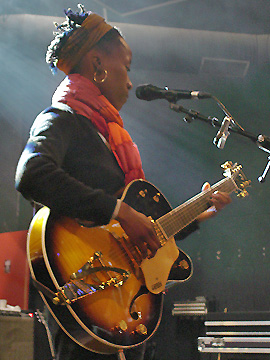
I knew I wanted an album that revolved around guitars, featuring a lot of different guitar ambiences. But before I could do that, I had to actually get familiar with the guitar again. I'd come to distance myself from the guitar over the years because I had to concentrate on working on my voice. I was also busy trying to understand the balafon and the ngoni and learning how to do arrangements. The entire time I was doing that I didn't play guitar at all. I knew I wanted to use a guitar with a fairly blues sound and I ended up coming across the Gretsch which I started composing on. After that, I had to think about what other instruments I wanted to keep around the guitar. I started thinking about what I could do with my voice and my songwriting to make a clear break with what had gone before. I wanted to have something that sounded a bit monotonous, with things repeating over and over until you ended up forgetting the monotony. I have to admit, I did a lot of writing, screwing things up and throwing stuff in the bin…
—Rokia Traore

Rokia Traore is from Mali. If there is a singular (or main) root-origin of the blues, Mali is it. This is a blues album—or, more precisely, a "pre-blues/African blues-root" blues record. Elemental. Simple riffs, supporting complex emotions, evocative guitar riffs accompanying distinctive voicings.
I don’t have a clue in terms of what these songs are about, except for “The Man I Love.” But the intimacy is so strong, I am inspired to supply my own meanings.
This is a dangerous recording, a risky recording. Not only is there no safety net, there is only the thinest of wires on which to cross to the other side.
If I didn’t know better, I would immediately suspect that this is one of those studio albums whose quiet floating feel would be impossible to duplicate in concert. Go here to see a video performance. (I’ve also included the audio track of “Kounandi (Live)” in the jukebox so you can compare and contrast it to the studio version.)
Rokia’s work has never been loud nor flashy, even when she had a lot of percussion there was always a quiet center to the music, an invitation to stillness even in the midst of dance, but on Tachmantché there is a deeper still. The light of this album is the after glow of love.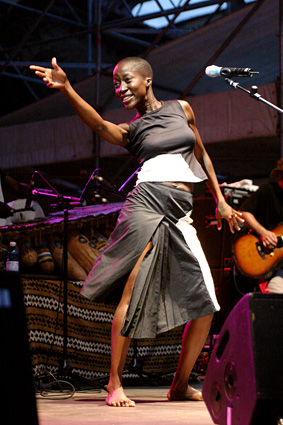
Go here to see a performance with Rokia’s previous band (WOMAD 2004)—in this way you will have a reference for how radical a turn Rokia embarked upon. It is like she is methodically tacking against the wind, achieving forward motion by slowly moving from side to side.
Rokia presented this music on tour before she recorded it, after one of the performances in France, Rokia opined, “I think I may get to like this new sound. It's very frank, very sincere, very direct and there's no artifice involved at all. Maybe this is the kind of album I'll end up making in the studio!”
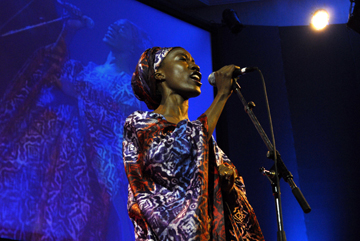
To all of the above add the astounding and iconoclastic version of “The Man I Love.” It starts off with what sounds like an ngoni (a four-string, luke-like, traditional Mali instrument). I could just be imagining or projecting but the way the player shapes the melody its almost like he’s playing with an accent. The opening is just three string instruments (bass, guitar and ngoni) with ngoni playing lead.
Then Rokia slinks in, a dramatic entrance. You know instantly English is not her first language but she’s working the syllables, micro-phrasing, shading the rhythm, a touch of vibrato, a wide dynamic range, hitting some notes harder than the others.
Around the three-minute mark, the tempo picks up slightly and Rokia switches out of English and really goes to town (or is it goes back to the bush?), improvising not only words but completely altering the melodic line. She breathes new life into a song that has been done to death.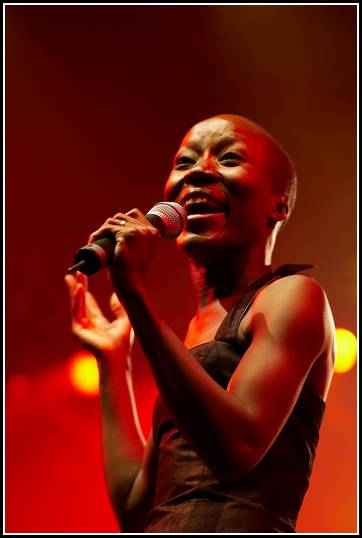
How in the world she came up with this arrangement is an intriguing mystery. For sure, it makes me fiend to hear Rokia do more covers. I just never thought of her covering American standards, but wow, she puts a lappa and fancy headwrap on that sad song and, goddamn, it becomes a beast (of beauty).
Maybe it’s because I was already a fan and have previously determined that from my perspective Rokia is a genius doing serious cultural work. Maybe not. Regardless, the reality is that this is one of the most interesting African vocal albums I’ve ever heard. Interesting and calming and inventive. And utterly beautiful.
—Kalamu ya Salaam
What a singer
Both Kalamu and I have already raved about Rokia's previous album. I won't say yet that this album is better than Bowmboï—hell, I haven't even heard the entire thing yet—but these are some truly superlative sound-creations. And I'm with Kalamu about the standards thing. How'd you like to hear Rokia take on an entire album of American ballads? Whew! I'd love to hear that.
Next week is our fourth anniversary. Typically, we do a retrospective thing, picking our favorite tracks from each other's selections of the previous 52 weeks. I'm just going to tell you know, the ONLY reason I won't pick one of these Rokia Traoré tracks is because it'd be silly to feature the exact same music two weeks in a row. But damn, these songs really are that good.
"Yorodjan" is some of the slinkiest, calmest and yet most infectious funk you'll ever hear. "Kounandi" is as relaxing as a massage after a long day at work. "A Ou Ni Sou" is plain hypnotic. It's a bare, open recording that sounds like it's issuing forth from Rokia's lips and then arriving at our ears somehow unmediated, unchanged and unaffected by microphones, recording devices, digitizing and play back equipment. It sounds like she's here, or rather, like you're there. "There" being where ever it is Rokia is, or was, when she created these beautiful sounds. When I listen to Rokia sing, I feel the need to quiet down, relax and just enjoy even though I'm here in a condo in San Diego and she's way overseas somewhere, and not just that, she's long done singing these song anyway. I know it's silly to feel this way, but I actually feel like I don't want to disturb, distract or interrupt her while she's doing her thing. What a singer. What a musician.
—Mtume ya Salaam
This entry was posted on Monday, June 9th, 2008 at 2:15 am and is filed under Contemporary. You can follow any responses to this entry through the RSS 2.0 feed. You can leave a response, or trackback from your own site.
3 Responses to “ROKIA TRAORÉ / “The Man I Love””
June 10th, 2008 at 12:12 am
great to hear the new release. the cover of the man I love dropped my jaw – wasn’t expecting it at all. rokia has alwas had that chilled bluesy feel, but with the cover she moves to a new space, while still adding something of her own – the sign of a great cover. overall, her music on this release seems to be even more intimate and stright from the soul – the stillness you describe captures it perfectly. stunning voice, stunning woman.
November 18th, 2008 at 9:25 am
i love this woman. she is a brilliant musician.
and also i wanted to thank you for bringing to my awareness that she has released another album!
i’m gonna get it asap.
Leave a Reply
| top |